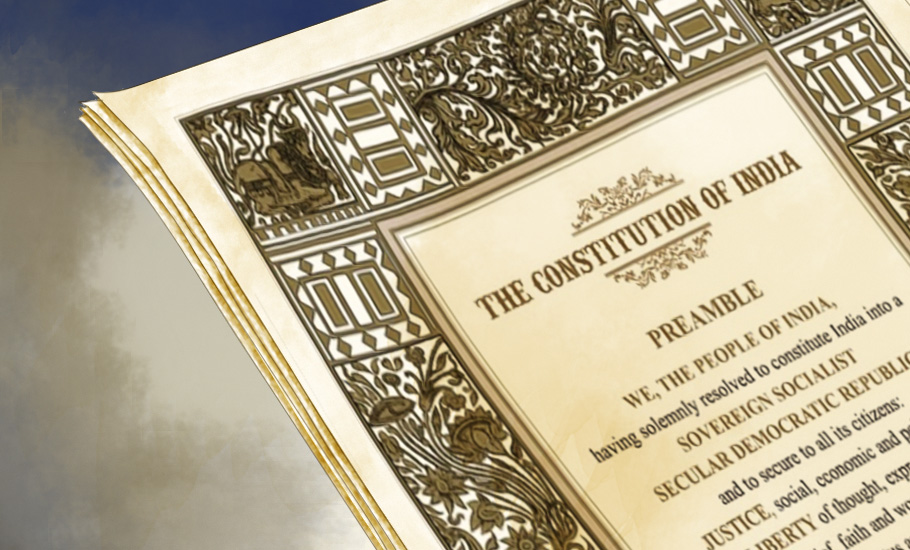
Why Nehru, Ambedkar did not want ‘Socialist’ and ‘Secular’ in Preamble

The Preamble to the Indian Constitution begins: “We, the People of India, having solemnly resolved to constitute India into a Sovereign, Socialist, Secular, Democratic Republic.”
One must remember that the words “Socialist” and “Secular” were not in the original Preamble and were added through the 42nd Amendment in 1976 by former Prime Minister Indira Gandhi, during the Emergency.
It is interesting to note that both Jawaharlal Nehru and Dr BR Ambedkar were not in favour of including those two words, while the Constitution was being drafted by the Constituent Assembly.
Nehru’s views
According to historians, Jawaharlal Nehru was indifferent to religion and identified secularism as a possible source of dogma and towards the end of his life, he had said at a meeting of the Congress Parliamentary that secularism is not a happy word. Noted historian Madhavan Palat, while delivering a talk some years ago on “The Spiritualism in Nehru’s Secular Imagination” quoted Nehru as saying: “It does not mean we are anti-religious, it just means India is not formally entitled to any religion as a nation.” Further, he said that Nehru “distrusted” the word secular as he thought it was not a happy word and may be a source of dogma.
It seems, Palat said that Nehru was completely committed to the idea of freedom of the mind, by which he meant people would not accept any kind of dogma — not only from religion, but from other sources. “For Nehru, everything that tended to be in excess, which is dogma, had to be tempered. Religion was tempered by reason, reason by scientific temper. Science by transcendentalism, liberal individuals by socialist corporations, socialism by conservatism and pragmatism. Nationalism by internationalism and secularity by spirituality.”
He was a socialist, obviously liberal, but plainly conservative in certain arguments and set them all under the rubric of spirituality to combine all these positions despite their seeming contradictions, Palat said.
“This led Nehru to avoid two pregnant words — democracy and socialism — while framing the Constitution as he believed that these divide rather than unite people,” added Palat in his talk.
Also read: Constitution Day: As Preamble moves from plain text to protest tool
It is because he felt that there was not enough of a consensus on both these issues, that there are divergent points of view, said Ramesh, adding that Nehru had told VK Krishna Menon, who drafted the Preamble, to ‘go a little slow’ on these two words. But, this did not mean that they were not socialist or secular.
“It is interesting in 1947, Nehru was telling Krishna Menon, ”go easy on these two words”, we know we are… remember Hindu Mahasabha was in the first Cabinet. There was Syama Prasad Mookerjee, it was an all-party cabinet. So Nehru was a little slow on this but that doesn’t mean they were not sociaist or secular,” pointed out Ramesh.
Ambedkar’s views
According to the Constituent Assembly debates, the words were omitted in the original text as chairman of the drafting committee of the Constitution, Dr BR Ambedkar reasoned that there was no need to include the term ‘secular’ as the entire Constitution embodied the concept of secular state, which meant non-discrimination on grounds of religion and equal rights and status to all citizens.
On the inclusion of the term ‘socialist,’ he said it is against the very grain of democracy to decide in the Constitution what kind of society the people of India should live in.
Also read: Reciting preamble to Constitution mandatory in Maha schools from Jan 26
“It is perfectly possible today for the majority of the people to hold that the socialist organisation of society is better than the capitalist organisation of society. But it would be perfectly possible for thinking people to devise some other form of social organisation, which might be better than the socialist organization of today or of tomorrow. I do not see, therefore, why the Constitution should tie down the people to live in a particular form and not leave it to the people themselves to decide it for themselves,” he had said.
His words had influenced the final decision to omit the two words.
Significance of “Socialist” and “Secular” in our Preamble
Before the term “Socialist” was added to the Preamble, some of the Directive Principles of State Policy in the Constitution had socialist content. The term “socialist” here means that wealth should be shared equally by society and not be concentrated in the hands of a few rich people and that the government should be responsible for reducing socio-economic inequalities.
Secular means that the relationship between the government and religious groups are determined according to the Constitution and law. It separates the power of the state and religion. It means that all religions are equally respected and that there is no state religion. All the citizens of India are allowed to profess, practice, and propagate their religions.
(With agency inputs)

